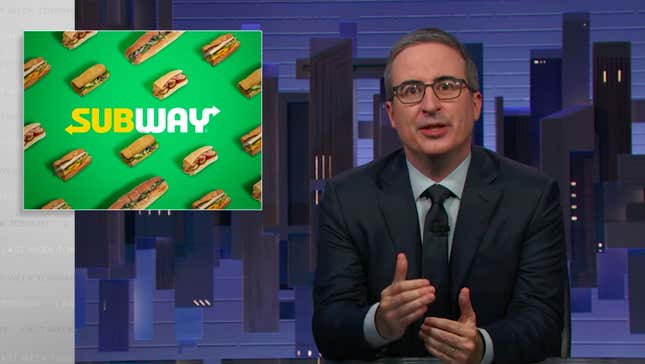
We’ve been saying it for years: Subway sucks, man. The chain was founded by a short-sighted tyrant and continually makes headlines for ignoring the needs of franchisees. Also the bread smells bad. Now, vindication is ours: Last Week Tonight host John Oliver has spoken out against the chain. In honor of Oliver’s well-deserved Subway smite, let’s recap the chain’s most public failings.
Subway’s most public scandals: A brief primer
Oliver kicked off the most recent episode of Last Week Tonight with a quick summary of Subway’s various scandals. Like the time the Irish Supreme Court declared that Subway’s bread is so sugary, it can’t legally be called bread. Or the time a lawsuit alleged that Subway’s tuna contains “anything but tuna.” Or the time a Subway employee posted a video of himself decorating a toilet seat with cold cuts. Or the fact that overenthusiastic Subway spokesman Jared Fogle was sentenced to 15 years in prison on child porn and child sex charges. Dark stuff indeed—but, as Oliver points out, the real problem lies with Subway’s treatment of its franchisees.
Why some franchisees are fed up with Subway
After reviewing the brand’s many scandals, Oliver focused his attention on Subway’s aggressive rate of expansion. Over the course of half a century, Subway became the biggest restaurant chain in the U.S. (It was the biggest in the world for a time.) But now, as Oliver explains, thousands of Subway locations have closed worldwide, leaving franchisees in the dust.
Why are Subway franchisees struggling while other fast food destinations thrive? Oliver explains that Subway treats its franchisees astoundingly poorly, demanding high royalties and enforcing impossibly strict non-disparagement and non-disclosure clauses to protect the brand’s already lousy reputation. Oliver points out other issues in Subway’s franchisee contract—for example, the fact that the company reserves the right to open a new location right next door to an existing one. All of that, plus the brand’s history of embarrassing failed giveaways, is enough to make customers run screaming for the hills. Not so fast, says Oliver.
“Your instinct might be to now never go to your local Subway,” Oliver said. “It might have been your instinct before this segment began, and honestly it remains a good one. But it’s worth remembering that some have spent their life savings on these stores, believing the promise that they could be their own boss, and are now stuck in a business model that was stacked against them from the start.”
It’s a good reminder that, while fast food mega-corporations are almost laughably evil, there are real people on the ground trying to make a living in spite of that precedent.